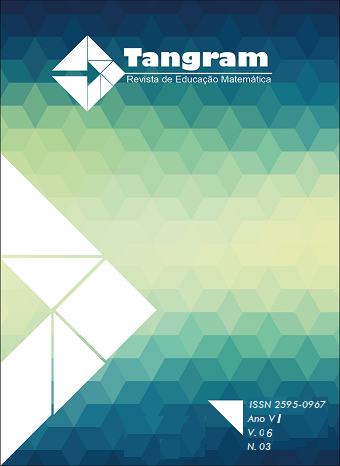Teaching Olympics, Inclusive Education and GeoGebra: a proposal for teaching Plane Geometry using Olympic Problems
DOI:
https://doi.org/10.30612/tangram.v6i3.17410Keywords:
GeoGebra, Didactic Engineering, Maths Kangaroo, Plane Geometry, Olympic ProblemAbstract
This article presents a teaching proposal that aims to encourage the adherence of the Mathematical Olympiads in the classroom, aiming at learning and the inclusion of the deaf. In the particular case of this paper, we suggest the statements present in the questions of the Kangaroo Maths Olympiad Brazil. It aims to contribute to the teaching of the concepts of percentage and area of plane figures, from two problems of the Maths Kangaroo Brazil. For this, we used Didactic Engineering as a research methodology, with the support of GeoGebra, the didactic situations were elaborated based on the Theory of Didactic Situations, from the concept of Olympic Didactic Situation, and were structured with the GeoGebra software. The association of Olympic Problems with GeoGebra enabled students to construct knowledge, based on a visual perception and manipulation of the software, as well as an interaction and inclusion of the student, providing him with the development of mathematical knowledge. Therefore, we consider that the results obtained were satisfactory for those involved in the process, in addition to providing readers with a reflection on the teaching of mathematics, the use of Olympic problems and software for its teaching, as well as the inclusion of students with special needs and their learning.
Downloads
References
Almouloud, S. A. (2007) Fundamentos da Didática da Matemática. Curitiba: Editora UFPR.
Alves, F. R. V. (2020). Situações didáticas olímpicas (SDOs): ensino de olimpíadas de matemática com arrimo no software GeoGebra como recurso na visualização. Revista Alexandria, 13(1), 319-349. https://doi.org/10.5007/1982-5153.2020v13n1p319
Alves, F. R. V. (2021). Situação Didática Olímpica (SDO): Aplicações da Teoria das Situações Didáticas para o ensino de olimpíadas. Revista Contexto & Educação, 36(113), 116-142.
https://doi.org/10.21527/2179-1309.2021.113.116-142
Artigue, M. (1994). Engineering as a framework for the conception of teaching products. In: BIEHLER, R.; SCHOLZ, R.; STRÄSSER, R.; WINKLEMANN, B. Didactics of Mathematics as a scientific discipline. Dordrecht: Kluwer Academic Publishers. Recuperado de https://hchicoine.files.wordpress. com/2008/05/biehler-r-scholz-rw-strasser-r-et-winkelmann-b-dir-1994.pdf
Artigue, M. (1996). Engenharia Didática. In: BRUN, J. Didáctica das Matemáticas. Lisboa: Instituto Piaget. Horizontes Pedagógicos, 193-217.
Artigue, M. (2013). L'ÉDUCATION MATHÉMATIQUE COMME CHAMP DE RECHERCHE ET CHAMP DEPRATIQUE: Résultats et défis. EM TEIA –Revista de Educação Matemática e Tecnológica Iberoamericana, 3(3), 1-20. Recuperado de https://periodicos.ufpe.br/revistas/emteia/article/view/ 2192/1763
Brousseau, G. (1986). Théorisation des phénomènes d’enseignement des Mathématiques. Thése (Doctorat d´Etat), Université Bourdeaux I. Recuperado de https://theses.hal.science/tel-00471995/file/ TheseetAnnexesGBA.pdf
Brousseau, G. (2008). Introdução ao Estudo das Situações Didáticas: conteúdos e métodos de ensino. São Paulo: Ática.
CANGURU DA MATEMÁTICA. (2023). Prova Canguru de Matemática Brasil, Recuperado de https://www.cangurudematematicabrasil.com.br/ concurso/provas-anteriores.html
Cury, F. G. (2019). Análise de um livro didático de Geometria plana apoiada na hermenêutica de profundidade. Zetetiké, 27. https://doi.org/10.20396/zet.v27i0.8654251
Kenski, V. M. (2012). Educação e Tecnologias: o novo ritmo da informação. 8ª ed. São Paulo: Papirus.
Hohenwarter, M., & Preiner, J. (2007). Dynamic Mathematics with GeoGebra. The Journal of Online Mathematics and Its Applications, 7. Recuperado de http://www.sciepub.com/reference/247866
Moura, J. B. (2023). Práticas e pesquisas de alunos e docentes do curso de Licenciatura em Matemática IFMT campus Juína. Jundiaí: Paco e Littera.
Santiago, P. V. S., & Alves, F. R. V. (2021). Situações didáticas na Olimpíada Internacional de Matemática. Revista de Ensino de Ciências e Matemática, 12(6), 124. https://doi.org/10.26843/rencima.v12n6a29
Teixeira, A. S. M., & Mussato, S. (2020). Contribuições do software GeoGebra nas aulas com sólidos geométricos de faces planas nos anos iniciais do ensino fundamental. REAMEC - Rede Amazônica de Educação em Ciências e Matemática, 8(3), 449–466. https://doi.org/10.26571/reamec.v8i3.10835
Zabala, A. (1998). A Prática Educativa: Como educar. Porto Alegre.
Wagner, E. (2015). Uma introdução às construções geométricas. Rio de Janeiro: IMPA.
Downloads
Published
How to Cite
Issue
Section
License

This work is licensed under a Creative Commons Attribution-NonCommercial-ShareAlike 3.0 Unported License.
Authors must accept the publication rules when submitting the journal, as well as agree to the following terms:
(a) The Editorial Board reserves the right to make changes to the Portuguese language in the originals to maintain the cultured standard of the language, while respecting the style of the authors.
(b) Authors retain the copyright and grant the journal the right to first publication, with the work simultaneously licensed under the Attribution-NonCommercial-ShareAlike 3.0 Brazil (CC BY-NC-SA 3.0 BR) that allows: Share - copy and redistribute the material in any medium or format and Adapt - remix, transform, and create from the material. CC BY-NC-SA 3.0 BR considers the following terms:
- Attribution - You must give the appropriate credit, provide a link to the license and indicate whether changes have been made. You must do so under any reasonable circumstances, but in no way that would suggest that the licensor supports you or your use.
- NonCommercial - You may not use the material for commercial purposes.
- Sharing - If you remix, transform, or create from material, you must distribute your contributions under the same license as the original.
- No additional restrictions - You may not apply legal terms or technological measures that legally restrict others from doing anything that the license permits.
(c) After publication, authors are allowed and encouraged to publish and distribute their work online - in institutional repositories, personal page, social network or other scientific dissemination sites, as long as the publication is not for commercial purposes.








